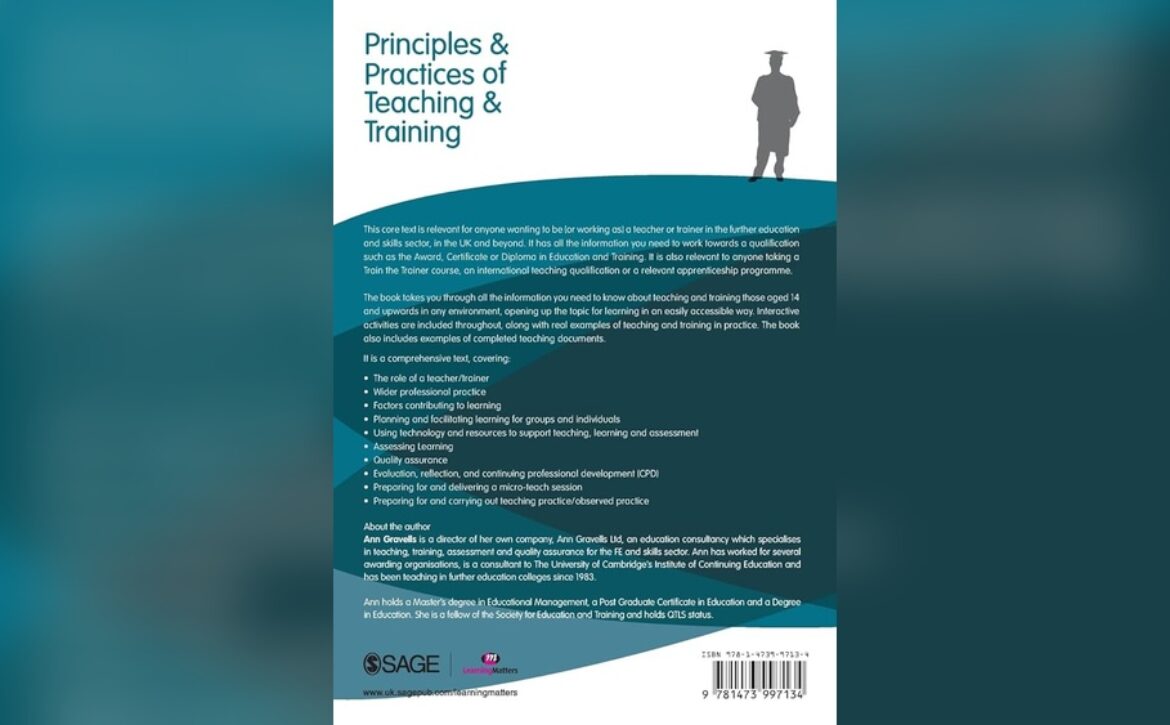
How to Become a Pgce Further Education: Expert Guide
Are you passionate about teaching and looking to make a real impact in the world of further education? If the thought of inspiring the next generation of learners excites you, then becoming a PGCE (Postgraduate Certificate in Education) in Further Education might be your perfect fit.
This guide will unravel the steps you need to take to enter this rewarding field. Imagine walking into a classroom where eager minds are ready to absorb the knowledge you have to offer. Picture yourself as the catalyst for their future success, guiding them through complex concepts and watching their eyes light up with understanding.
The path to becoming a PGCE in Further Education is not just a career choice; it’s a chance to transform lives, including your own. Stay with us as we break down the entire process into manageable steps, offering insights and tips that can make your journey smoother and more fulfilling. Whether you’re just beginning to explore this career path or are ready to take the plunge, this article will provide you with everything you need to know to turn your teaching aspirations into reality.

Choosing The Right Pgce Program
Finding the right PGCE program is crucial for teaching in further education. Consider course content and teaching methods. Research accreditation and support services to ensure a suitable fit for your career goals.
Choosing the right PGCE program is a crucial step in your journey to becoming a qualified educator in further education. The right program can shape your teaching philosophy, impact your career opportunities, and influence your overall satisfaction in the field. How do you ensure you make the best choice?
Factors To Consider
When selecting a PGCE program, think about the location. Are you willing to relocate for a year or more? Consider the program’s format—does it offer part-time options if you’re working? Look at the course content and make sure it aligns with your teaching interests. You might find some programs focus heavily on theoretical aspects, while others emphasize practical teaching experience.
Specializations Available
Different PGCE programs offer varied specializations. Are you interested in teaching humanities, sciences, or vocational subjects? Some programs might offer unique paths like digital education or adult literacy. Choose a specialization that not only interests you but also matches the demand in the job market. This can open doors to specific teaching roles that are often in high demand.
Accreditation Importance
Accreditation is a key factor that cannot be overlooked. Is the program recognized by reputable educational bodies? A PGCE program with proper accreditation ensures your qualification is respected and recognized. It can affect your employability and the trust employers place in your credentials. Make sure the program you choose is accredited to avoid any future setbacks in your teaching career. Selecting the right PGCE program requires careful thought and research. Are you prepared to make a decision that will impact your teaching journey? Take the time to evaluate your options thoroughly, and you’ll find a program that aligns perfectly with your goals.
Application Process
Begin the journey to becoming a PGCE Further Education by researching eligibility criteria and required qualifications. Submit an application through the university’s online portal, including transcripts and references. Prepare for interviews that assess your passion and commitment to teaching.
Embarking on the journey to become a PGCE Further Education candidate is an exciting step towards a rewarding teaching career. The application process is your first gateway to this path. It’s more than just filling out forms; it’s about showcasing your dedication and potential to shape future minds. Understanding the steps involved, and preparing thoroughly, can make the difference between a smooth process and a stressful one.
Eligibility Criteria
Before you start your application, ensure you meet the basic eligibility requirements. You need a bachelor’s degree or equivalent in the subject you wish to teach. Some programs may require you to have relevant work experience, especially if your degree isn’t directly related to your chosen teaching field. Check the specific requirements of the institutions you’re interested in. Some might have additional prerequisites. This will save you time and help you focus on applications where you meet all the criteria.
Required Documents
Gather your documents early to avoid last-minute stress. You will need your academic transcripts, a personal statement, and references. Your personal statement is crucial; it’s your chance to tell your story. Make sure your references are from people who know your capabilities well, like a former professor or employer. They should be able to vouch for your skills and potential as a teacher.
Tips For A Successful Application
Crafting a standout application involves more than just ticking boxes. Highlight your passion for teaching and any relevant experience you have. Tailor your personal statement to reflect why you are a perfect fit for PGCE Further Education. Consider visiting the campus or attending open days. This can give you insights that might set your application apart. Engage with current students or faculty to understand the program better, and mention these insights in your application. Have you thought about what makes you unique? Use this to your advantage. Whether it’s a special project you led or a unique experience that shaped your teaching philosophy, let it shine through. Approach this process with confidence and clarity. Remember, the application is just the beginning of a transformative journey in education.
Understanding The Curriculum
Embarking on the journey to become a PGCE Further Education teacher is both exciting and challenging. Understanding the curriculum is crucial to your success, as it lays the foundation for your teaching skills. You need to familiarize yourself with the core modules, elective options, and practical teaching experiences that will shape your educational path. Let’s dive into the specifics of what you can expect.
Core Modules
The core modules are the backbone of your PGCE program. They cover essential teaching skills and educational theories that you will rely on throughout your career. Expect to explore topics like lesson planning, classroom management, and assessment techniques. These modules will equip you with practical tools to engage your students effectively.
Consider how you can apply these skills in real-world scenarios. When I learned about differentiated instruction, it transformed my approach to diverse classrooms. How will these core skills impact your teaching style?
Elective Options
Elective options offer you the chance to tailor your PGCE experience to your interests. You can choose modules that focus on specific subjects or educational technologies. If you’re passionate about digital learning, for example, electives in educational technology can deepen your understanding.
Think of electives as a way to stand out and specialize. Your unique choices can shape your future teaching identity. What subjects or skills are you eager to explore further?
Practical Teaching Experience
Practical teaching experience is where theory meets practice. You’ll step into the classroom, apply what you’ve learned, and refine your approach. This hands-on experience is invaluable and can be both daunting and exhilarating.
During my teaching practicum, I discovered the importance of adaptability. No two classes are the same, and real-world teaching requires quick thinking. Are you ready to embrace the unpredictability of the classroom?
Understanding the curriculum is your first step toward becoming an effective PGCE Further Education teacher. Dive into the modules, explore electives, and embrace practical experiences to shape your teaching journey.
Developing Teaching Skills
Developing teaching skills is crucial for aspiring educators in further education. Effective teaching requires a blend of creativity, patience, and strategy. Mastering these skills ensures meaningful student engagement and learning. PGCE candidates need to focus on three key areas: classroom management, lesson planning, and assessment methods. Each area contributes significantly to the overall teaching experience. Let’s explore these essential components of teaching skills in further education.
Classroom Management Techniques
Managing a classroom involves setting clear rules and expectations. Establishing a respectful environment encourages students to participate actively. Use positive reinforcement to motivate students. Organize the classroom layout to facilitate interaction and focus. Address disruptions calmly, maintaining authority without aggression. Regularly assess your management strategies for effectiveness. Adapt them based on student behavior and feedback.
Lesson Planning Strategies
Effective lesson planning begins with clear objectives. Define what students should learn by the end of the lesson. Use a variety of teaching materials to cater to different learning styles. Include activities that promote critical thinking and problem-solving. Allocate time for discussions and questions. Prepare backup activities in case of unforeseen interruptions. Review previous lessons to connect new topics with existing knowledge.
Assessment Methods
Assessments measure student understanding and progress. Use a mix of formative and summative assessments to gauge learning. Formative assessments provide ongoing feedback during the learning process. Summative assessments evaluate knowledge at the end of a unit. Include quizzes, assignments, and projects to diversify assessment formats. Encourage self-assessment to promote reflection and independent learning. Regularly review assessment outcomes to identify areas for improvement.
Career Opportunities In Further Education
Exploring career opportunities in further education starts with a PGCE qualification. This teaching certification opens doors to instruct adult learners. Aspiring educators can specialize in various subjects, enhancing their skills and knowledge to thrive in dynamic learning environments.
Embarking on a career in further education opens up a world of opportunities that go beyond the traditional classroom. With a PGCE in Further Education, you can shape the future of adult learners, helping them acquire new skills and knowledge to advance their careers. But what does the job market look like, and who might employ you? Let’s explore the exciting career prospects in further education.
Job Market Overview
The job market for further education is dynamic and ever-changing. As industries evolve, the demand for skilled educators in vocational and adult learning continues to rise. From technical skills to soft skills, the variety of subjects you can teach is vast. Have you ever thought about teaching digital marketing or advanced plumbing? There’s a niche for almost every interest. With the increasing focus on lifelong learning, your expertise as an educator can play a crucial role in shaping future professionals. Are you ready to be part of this transformative journey?
Potential Employers
The range of potential employers in further education is diverse. Community colleges, vocational schools, and adult education centers are just the beginning. Private training companies and corporate training departments also seek skilled educators to enhance their workforce. Could you see yourself delivering impactful training in a corporate setting? Some educators find rewarding careers in non-profit organizations, helping underserved communities access education and skill development. Where do you see your passion making the most impact?
Advancement Prospects
Advancement in further education isn’t limited to moving up the ladder. You can diversify your skills, exploring roles such as curriculum development or educational consultancy. Many educators transition into administrative roles, shaping educational policies and programs. Have you considered how your leadership skills could redefine adult education? With experience, you might even branch out into research and development, discovering new methodologies to enhance learning. How would you like to contribute to the future of education? Further education provides a platform to expand your career horizons, offering opportunities to grow, lead, and innovate. So, where will your journey take you next?
Continuous Professional Development
Continuous Professional Development (CPD) is a key component for anyone pursuing a PGCE in Further Education. In the dynamic world of education, staying updated with new teaching methodologies and educational technologies is crucial. CPD not only enhances your skills but also boosts your confidence and effectiveness as an educator.
Importance Of Lifelong Learning
Why is lifelong learning important for educators? It keeps you adaptable and resilient. The education landscape is ever-evolving, and continuous learning ensures you remain relevant. Imagine standing in front of a class, equipped with the latest teaching strategies—your students will thrive under your guidance. Are you ready to embrace a mindset that never stops growing?
Training Courses And Workshops
Training courses and workshops are practical ways to enhance your skills. They offer hands-on experiences and real-world scenarios that prepare you for classroom challenges. Consider enrolling in courses focusing on digital tools for education or specialized teaching techniques. These opportunities can provide you with unique insights that textbooks might overlook.
Networking And Mentorship
Networking and mentorship play a vital role in your professional development. Connecting with fellow educators opens doors to shared resources and collaborative learning. Have you thought about reaching out to a seasoned mentor? Their experiences can guide you through complex teaching situations and inspire your growth. Building a supportive network is an investment that pays off in your teaching career.
Embracing Continuous Professional Development equips you with the skills needed to navigate the challenges and opportunities within Further Education. Through lifelong learning, engaging courses, and strong networks, you carve a path to becoming an exceptional educator. Are you ready to take the first step?
Frequently Asked Questions
What Is A Pgce In Further Education?
A PGCE in Further Education is a postgraduate certificate for teaching in colleges and adult education. It equips educators with the skills to teach subjects to learners aged 16 and above. This qualification is essential for those aiming to teach in further education institutions in the UK.
How Long Does A Pgce Course Take?
A full-time PGCE course typically takes one academic year to complete. Part-time options are available and usually take two years. The course combines academic study with practical teaching experience, ensuring a comprehensive understanding of educational practices.
What Are The Entry Requirements For A Pgce?
Entry requirements include a relevant degree and GCSEs in English and Maths. Some courses may require experience in further education settings. It’s essential to check specific university requirements as they can vary.
Can I Teach Without A Pgce?
Yes, you can teach in further education without a PGCE, but it enhances your skills and job prospects. Many institutions prefer qualified candidates, and a PGCE provides structured training and teaching experience.
Conclusion
Becoming a PGCE in Further Education is an exciting journey. Start by understanding the requirements and enrolling in a suitable program. Stay committed and focused throughout your studies. Connect with peers and educators to gain insights. Practical experience is crucial, so embrace every teaching opportunity.
Keep learning and adapting to new teaching methods. This path opens many doors in education. Your dedication will help you succeed. Remember, teaching is about passion and making a difference. With these steps, you can reach your goal. Enjoy the rewarding journey of becoming a PGCE in Further Education.




